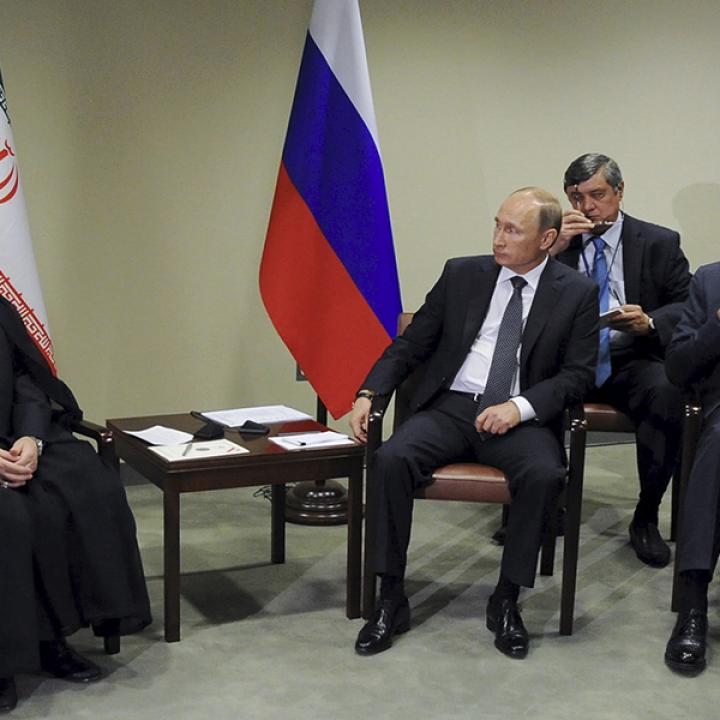
- Policy Analysis
- Policy Alert
Russia's Syria Move Is a Mixed Blessing for Iran

For all the praise (and relief) Moscow's deployment is eliciting in Tehran, continued Russian involvement will likely cut into Iran's influence.
It comes as no surprise that Iran is praising Vladimir Putin's show of force in Syria. The spokesperson for Iran's Foreign Ministry has called it "a step forward in the fight against terrorism and the resolution of the ongoing crisis in the region." And Mohsen Rezaii, a seasoned politician and former head of the Islamic Revolutionary Guard Corps, went so far as to suggest that Moscow's involvement could encompass the Iraqi theater too. Purportedly dispatched to fight the Daesh/ISIS, Russia's Sukhoi jets enter the skies of Syria at a time when Bashar al-Assad's regime has suffered a series of military setbacks. After heavily supporting the regime through four years of war, Iran no doubt sees the intervention as a form of burden sharing.
Indeed, recent Moscow visits by senior Iranian officials -- including Qods Force commander Qasem Soleimani in July and chief Middle East diplomat Hossein Amir-Abdollahian in September -- suggest a degree of coordination. As early as February, Ali Akbar Velayati, the Supreme Leader's diplomatic advisor, traveled to the Russian capital and met with President Putin for what was described as a strategic conversation. And last week, Iraqi military officials announced the creation of a coordination cell in Baghdad to liaise with the Kremlin, Damascus, and Tehran on intelligence and security matters. Newly deployed Russian assets will prop up Assad forces on the ground, but they might also support Hezbollah -- a concern that Israeli prime minister Binyamin Netanyahu likely raised during his own recent trip to Moscow. There is now talk of a second coalition -- one distinct from the U.S.-led coalition formed a year ago to roll back ISIS.
But with coalitions come coalition politics, where the most influential partners are those who are able and willing to contribute key capabilities and commit troops to the riskiest missions. In addition to putting boots on the ground, Russia has deployed a cavalry of attack helicopters and fighter bombers that can provide support to Assad's embattled forces all over Syria while potentially obstructing Western and Arab air forces. This is a contribution that Iran can hardly match, with its scarce and antiquated aircraft procured mostly in the time of the shah. Nor does it need to now that the Russians are in. Tehran's military posture is one of defensive and asymmetric warfare rather than force projection. So far, it has deployed mainly noncombat personnel to Syria -- advisors, trainers, and mentors, embedded at all levels of the Assad war machine -- while Hezbollah and other Iranian-backed militias have done most of the fighting.
Russia is also in a better position to leverage its military role on the diplomatic stage, as demonstrated by Putin's lengthy meeting with President Obama in New York on the sidelines of the UN General Assembly, the first of its kind in a couple years. While Iran remains defiant toward Washington and entangled in a regional showdown with Saudi Arabia, Russia has shown a willingness to engage Western and regional countries on Syria (albeit to little avail so far). Moreover, many of the secular, Baathist officers who make up the Syrian regime's spine did much of their early training (and often found wives) in the Soviet Union, so they may prefer Russian advocates to their cumbersome protectors from the Islamic Republic. Thus, for all the praise (and relief) the intervention has engendered in Tehran, Russia's presence in Syria (and to a lesser extent Iraq) poses a challenge to Iran's influence -- both on the conduct of the war and on an eventual settlement, when Russian and Iranian interests may differ.



